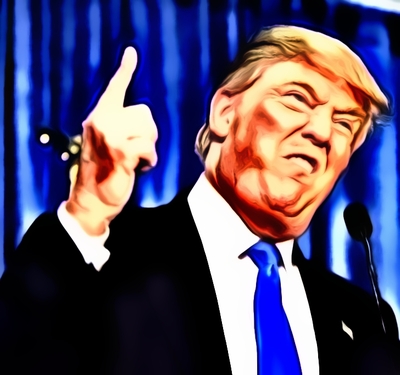
WASHINGTON — Senators — who needs them?
Most presidents try not to feud with members of Congress from their own party. But President Donald Trump is known for shredding the rulebook, so why would congressional etiquette be any different?
The New York Times reported this week that Trump and Senate Majority Leader Mitch McConnell are feuding bitterly, if privately, save for the occasional tweet. On Tuesday, the president took the act public when he traveled to Phoenix and bashed Arizona's two U.S. senators from his own party — on their home turf. Call it the anti-charm offensive.
Trump pretended he wasn't quite doing that, because he did not criticize Republican Sens. John McCain or Jeff Flake by name. Instead Trump declared he would not single out any local politicians as he lamented that the Senate health bill failed because it was "one vote away" from passage — a reference to McCain's vote against the "skinny repeal bill" to end Obamacare.
The bill needed 50 votes to pass but garnered support from only 49 of 52 GOP senators as Lisa Murkowski of Alaska and Susan Collins of Maine joined McCain in opposing it. The Phoenix rally audience gleefully "booed" at the McCain reference — undeterred by the fact that the former Vietnam prisoner of war is recuperating from aggressive treatment of recently diagnosed brain cancer.
Trump then added, "Nobody wants me to talk about your other senator, who's weak on borders, weak on crime, so I won't talk about him." It was a clear reference to Flake, who supported efforts to reform federal immigration law and the federal criminal justice system.
In case there was any doubt, Trump dropped his no-name directive in a Wednesday morning tweet: "Phoenix crowd last night was amazing — a packed house. I love the Great State of Arizona. Not a fan of Jeff Flake, weak on crime & border!"
"I think it's a very risky strategy," said John Tuman, chairman of the UNLV Department of Political Science. "They have such a razor-thin majority in the Senate."
Trump cannot afford to lose any of the 52 Republican votes in the Senate on future legislation, as happened with health care. And Trump has jeopardized the GOP's slim majority by targeting Flake, who is up for re-election in 2018.
Earlier this year, Trump made Sen. Dean Heller, R-Nev., more vulnerable when he singled him out during a session with GOP senators. "Look, he wants to remain a senator, doesn't he?" Trump asked — on camera. Heller voted for the skinny repeal bill; still, perennial candidate Danny Tarkanian chose to oppose him in a Republican primary.
Flake also voted for the skinny repeal bill — but Trump has praised Flake's primary challenger Kelli Ward on Twitter.
"Why force people to use their resources fending off a primary challenge?" Tuman asked.
John Hart, a Republican strategist who was communications director for former Sen. Tom Coburn, R-Okla., sees Trump's criticism of Flake as "an enormous mistake."
Flake's new book, "Conscience of a Conservative: A Rejection of Destructive Politics and a Return to Principle," was sure to set off Trump. Ditto Flake's refusal to endorse Trump in 2016 after the New York businessman won the GOP nomination.
But as Hart sees it, Trump's hits on Flake present a distraction from the president's agenda. "And he's handing the quote-unquote fake news media a very real story about an intra-party battle," Hart said.
After multiple queries, the closest comment to a defense of Trump's forays against GOP pols came from a Republican close to the White House, who did not want to be named. He saw the president "trying to preserve his image as an outsider by criticizing specific lawmakers for inaction by Congress" — in an effort that is counterproductive.
Tuman noted, "I'm continuously surprised at his inability to put things aside" to further his agenda. That's a strike against Trump — the suspicion that there is no strategy, only emotion, behind his spats.
McConnell's office highlighted Trump's volatility when it downplayed reports of the McConnell-Trump feud. "There are a lot of things that we talk about, but what we don't talk about is feelings," said McConnell Communications Director David Popp.
Former California Gov. Pete Wilson, a Trump supporter, believes Trump and McConnell need to meet privately to air their grievances. They need to focus on winning the 2018 midterm election, Wilson said. "You don't gratuitously inflict injury, and if you've got grievances, you air them in private."
"It's just not smart," Wilson said, for Trump and GOP leaders to spar when all should be focused on tax reform and immigration enforcement. Otherwise, he said, "I could care less. They're both big boys."
After the Times story came out, White House press secretary Sarah Huckabee Sanders issued a statement that said, "President Donald J. Trump and Senator Mitch McConnell remain united on many shared priorities, including middle class tax relief, strengthening the military, constructing a southern border wall, and other important issues.
"They will hold previously scheduled meetings following the August recess to discuss these critical items with members of the congressional leadership and the President's Cabinet. White House and leadership staff are coordinating regarding the details of those meetings."


 Contact The Editor
Contact The Editor
 Articles By This Author
Articles By This Author